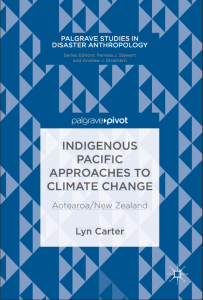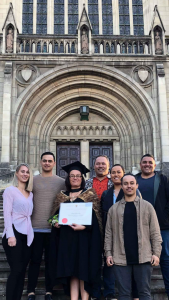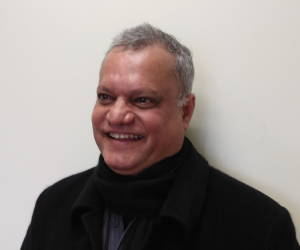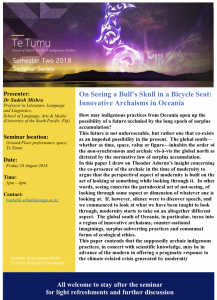10 questions with . . . Lyn Carter.
The Association of Social Anthropologists of Aotearoa/New Zealand recently conducted a ’10 questions with’ session with Te Tumu’s Lyn Carter about her newly released book Indigenous Pacific Approaches to Climate Change: Aotearoa/New Zealand on their blogsite. Click here to read all about it.
Latest Masters of Indigenous Studies Graduate
Graduation is always the culmination of a lot of hard work. At last week’s graduation, we had our latest graduate, Margaret Courtney, walk across the staff to collect her hard-earned Masters of Indigenous Studies degree certificate. Margaret, of Te Arawa (Tūhourangi,
Ngāti Whakaue, and Tapuika), also holds an LLB from Waikato University, and works as a Regional Advisor for Te Puni Kōkiri. I asked her to send me a short account of her studies, and the abstract of her research dissertation. Koia kei a koe, Margaret!
“My journey to complete my Masters qualification was a journey of personal growth, perseverance and enlightenment. Combining my experience of Whenua Māori, the Native Land Court system and integrating it with the history of our tūpuna and iwi has helped to fill knowledge gaps for my whānau. Given our ‘nuclear family’ upbringing my research emphasised the importance of Whenua Māori as a connection to our tūpuna but also strengthens our Whānau Mātauranga. It is this knowledge that we can pass onto our tamariki and mokopuna.
“The Master of Indigenous Studies programme at Te Tumu was the best option for me given I live and work in Rotorua. It provided a part time online option which complimented by mahi and lifestyle. The paper offerings provided choice and completing the dissertation cemented my learnings. I enjoyed the mixed forms of delivery and assessments.
“I am thankful for the support and patience of my supervisor Dr Paerau Warbrick. He provided good advice, steered me on track when needed, and helped me to extend my knowledge and research skills. Ka nui te mihi ki a koe, e whānaunga! To my whānau, your continued support is unwavering!”
Abstract
This research supports the view that whenua Māori is important in today’s global environment and remains a vital connection to our tūpuna, our iwi and our whānau history.
This is illustrated through an exploration of the author’s connection to Tūhourangi, an iwi of Te Arawa, the impact that the Native land legislation had on Tūhourangi and specifically the whenua, Rotomahana Parekārangi in the nineteenth century. The research explores the path of Rotomahana Parekārangi through the Native Land Court regime. The research concludes with an example of how the author’s whānau are making attempts to transmit their collective whānau mātauranga to the younger members of their whānau. This is in order to provide the whānau with experiences of the whenua, of their iwi and to understand the importance of their connection to the whenua derived from their tūpuna. It is important that the younger generation are cognisant of these connections and whānau mātauranga as, in time, they will become the kaitiaki of the whenua, and will need to pass this knowledge onto their mokopuna.
New book: Indigenous Pacific Approaches to Climate Change
 Climate Change is an issue for the Pacific. We are delighted to announce the lastest book by a Te Tumu scholar, Dr Lyn Carter, Indigenous Pacific Approaches to Climate Change, published as part of Palgrave’s Studies in Disaster Anthropology Series.
Climate Change is an issue for the Pacific. We are delighted to announce the lastest book by a Te Tumu scholar, Dr Lyn Carter, Indigenous Pacific Approaches to Climate Change, published as part of Palgrave’s Studies in Disaster Anthropology Series.
Dr Carter, a Ngāi Tahu scholar, is a member of Te Tumu’s Indigenous Development programme, and teaches the popular INDV301 course, Māori and Indigenous Development Ethics and Government.
From the publisher: “Situating Māori Ecological Knowledge (MEK) within traditional environmental knowledge (TEK) frameworks, this book recognizes that indigenous ecological knowledge contributes to our understanding of how we live in our world (our world views), and in turn, how we adapt to climate change.
“As an industrialized nation, Aotearoa/New Zealand (A/NZ) has responsibilities and obligations to other Pacific dwellers, including its indigenous populations. In this context, Lyn Carter discusses how A/NZ can benefit from the wider Pacific strategies already in place; how to meet its global obligations to reducing greenhouse gases; and how A/NZ can utilize MEK to achieve substantial inroads into long-term adaptation strategies and sustainable practices. Carter demonstrates that in all respects Māori tribal groups are well-placed to be key players: adaptation strategies, policies, and practices are integrated throughout Māori/Iwi traditional knowledge.”
Click here to access this new book.
Sudesh Mishra seminar
Te Tumu is honoured to be hosting Professor Sudesh Mishra from the University of the South Pacific, Fiji, who is in Dunedin for the next six weeks on the Ratu Sir Kamisese Mara Fellowship. He is a noted poet and literary critic, but his research is now taking new directions, in particular looking at Indigenous responses to modern ecological crises, such as climate change.
He will be giving a lecture in the Te Tumu Seminar Series at 3pm on 24 August on the Ground Floor of Te Tumu, entitled “On Seeing a Bull’s Skull in a Bicycle Seat: Innovative Archaisms in Oceania.” More details in the poster below. Please feel free to come along, and circulate this blog post to anyone who might be interested.





